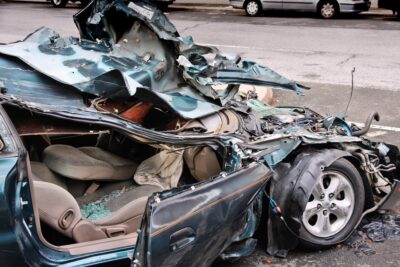
If you’ve lost a loved one in a fatal car accident, the last thing you need is a stressful, time-consuming, and expensive legal battle. However, if your loved one died because of another driver’s negligence, you shouldn’t hesitate to hold that driver accountable. You want justice for your loved one, and chances are your family needs compensation in the wake of their death. A car accident lawyer in Gainesville can help you achieve this.
Why You Should Call a Gainesville Fatal Car Accident Lawyer Immediately
While no amount of money can make up for your loved one’s death, the truth is your family will likely face substantial expenses, such as:
- Funeral and burial expenses
- Medical bills from emergency care your loved one received
- Lost wages your loved one would have earned
Your grief should not be compounded by the stress of how you’ll tackle these financial challenges. Instead, you should contact John Foy & Associates in Gainesville to determine if a wrongful death case may be a way for you to pursue fair compensation.
Get the strong arm
What Is a Wrongful Death Case?
To be awarded compensation for a loved one’s fatal car accident, your attorney should file a wrongful death lawsuit on your behalf. They must then be able to prove the driver was negligent. To prove negligence in a court of law, an attorney must address several things, including duty of care, breach of care, and causation.
Drivers have a legal duty to avoid hurting others. This duty doesn’t only extend to safe driving while on the road. It also means they must keep their vehicle in good working order.
An experienced fatal car accident attorney in Gainesville would first seek to show that a defendant owed the deceased a duty of care. For example, the lawyer might show evidence that the driver and the deceased shared the road at the time of the accident. Or in some cases, they might show that the driver lent the deceased their vehicle, which was subsequently involved in the accident.
Breach of Duty
Next, a Gainesville fatal car accident attorney would seek to prove that a defendant breached the duty of care. In cases where the defendant hit your loved one, a fatal car accident attorney in Gainesville can show that the defendant didn’t follow the rules of the road. For example, if the defendant rolled through a stop sign and hit your loved one, a clear breach of duty would be established.
A defendant may have breached their duty of care even if they were not behind the wheel. Suppose the defendant knowingly lent your loved one a car whose brakes didn’t work. If brake failure resulted in the death of your loved one, you could argue that the defendant had breached their duty of care.
Causation
It’s not enough for a Gainesville fatal car accident attorney to prove that the defendant simply breached their duty of care. They must prove that a breach of duty caused your loved one’s death. Proving causation is the backbone of establishing negligence in a court of law and winning a wrongful death case.
Proving causation is usually simplest in cases where your loved one died of injuries at the scene. However, that’s not always the case. Your loved one may have passed at the hospital, in which case, an insurance company might try to establish that medical malpractice caused their death.
In some cases, your loved one’s accident-related injuries may set off other prior injuries that resulted in their death. An insurance company may try to prove that those prior injuries were the issue and get medical experts to testify to that effect. Even if the accident triggered new injuries, it could be hard to prove causation, so reach out to an experienced fatal car accident attorney in Gainesville to fight on your behalf.
How to File a Wrongful Death Case in Georgia
Many people don’t want to pursue a lawsuit in the wake of their loved one’s death. They think, “Accidents happen,” and avoid confronting the reality that not all accidents are inevitable. Your loved one’s accident may have been avoidable had the other party not been negligent.
However, if you’re willing to pursue justice for your loved one and your family, the first step is to contact John Foy & Associates for a free case evaluation. If we do take your case, we operate on a contingency basis. If we don’t win your case, you don’t pay a dime.
Georgia law holds that only certain parties may bring a wrongful death lawsuit on behalf of a loved one. The law also indicates that these parties only have two years to file a suit from the date of the accident. However, it would help if you did so sooner, as the longer you wait, the harder it may be to build a winning case.
What Kind of Damages Can You Seek in a Wrongful Death Case in Georgia?
As a surviving family member, you can pursue damages for tangible and intangible losses. Tangible losses include expenses you’ve incurred, such as funeral expenses, medical debts, and lost wages. Intangible losses include the loss of care and companionship your loved one would have provided had they lived.
An estate representative can also seek damages on behalf of the deceased. Known as estate claims, this type of wrongful death claim is not limited to medical and funeral expenses. An estate can also seek damages for the pain and suffering of the deceased before they died.
In either case, you’ll want to work with your attorney to demonstrate that the accident resulted from negligence that would have likely resulted in a personal injury claim had the deceased lived. You’ll also want to show evidence of the expenses you, your family, and the estate have incurred and that there are surviving families who are entitled to proceeds of the deceased’s legal claims.
Call John Foy & Associates Today
We know that money will never make up for the loss of your loved one. However, your grief shouldn’t be compounded by financial hardship. This is particularly true if it is because of another party’s reckless, negligent, and illegal actions.
At John Foy & Associates, we’ve been helping surviving relatives file claims for more than two decades. We’re ready to help you get the justice you’re looking for and the compensation you need. Contact us today for a free consultation.
404-400-4000 or complete a Free Case Evaluation form


